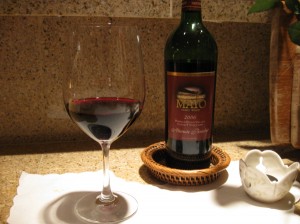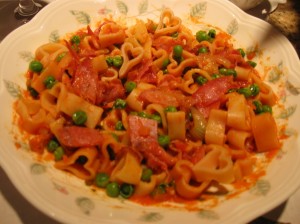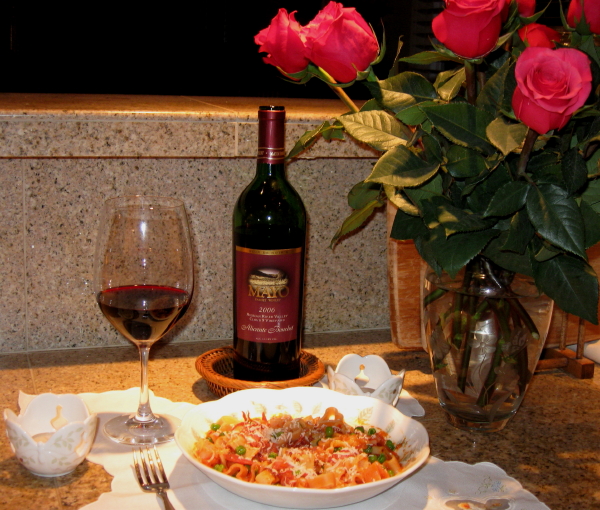Feb 10 2010
To Alicante, With Love

Generally those who appreciate wine have an obscure grape that they each hold dear. For me, that grape is Alicante Bouschet. Presently, less than one percent of the grape is planted in California and it is difficult to find a vintage made with one hundred percent of the grape. Alicante Bouschet was not originally obscure as during the Prohibition it was widely planted throughout California for permitted home winemaking. Since some state temperance laws allowed people to make wine for personal purposes, individuals in Northern States would buy grapes from warmer states in the South to make homemade wine. Given Alicante Bouschet’s hearty and rugged nature, it served as an excellent candidate for cross-country train travel thus providing aspiring wine enthusiasts the opportunity to make wine in their garages during the Prohibition.
Despite the lack of plantings in California (and the United States for that matter), Alicante Bouschet is also unique in its origin as it is a hybrid not just once, but twice of other grapes. In France in 1866, a viticulturist named Henri Bouschet cross-bred Grenache and Petit Bouschet to create Alicante Bouschet. Petit Bouschet, however, would not have existed had his father Louis not cross-bred two entirely different grapes (being Teinturier du Cher and Aramon) to create that grape in 1824. As complicated and time-consuming as these steps may sound, the results produced a unique grape.
Unlike most other grapes used to make red wine, Alicante Bouschet’s flesh and juice are both red. As a grape, its reputation is the “reddest of all reds” and once made into wine it is regarded as the “blackest of the black”. Of those grapevines presently in existence, the Alicante Bouschet grapes produced thereof are still hearty. They are tannic by nature and capable of strong acidity. A recent release of an Alicante Bouschet wine is not for the meek. On the other hand, if a bottle is set aside and stored properly, those same tannins and acidity can allow a wine to age and soften in the bottle for a long time to come. Frequently Alicante Bouschet is used to add dark, deep coloring to red wines or wines often referred to as “mixed black” wines. It is not common to find the grape made in a singular grape vintage as it is often criticized as being flabby or lacking much character. If found made well, the grape will romance the senses with dark fruit and bold spices.

In Sonoma County, Mayo Family Winery (“Mayo”) takes pride in specializing in single grape and/or single vineyard wine productions. Additionally, Mayo also enjoys making lesser known varietals, one being Alicante Bouschet. Mayo’s 2006 Alicante Bouschet features fruit from the Cloud 9 Vineyard in the Russian River Valley. The vineyard, known for its hot days and cool fog chilled evenings is a pleasant area for Alicante Bouschet. Opening a bottle, allowing it to decant a bit and then sampling the dark, alluring wine will lull the senses and truly put one on a proverbial “cloud 9”.
The nose of Mayo’s 2006 Alicante Bouschet is dark, mystical and romantic with aromas of blackberry, leather, cigar box and a hint of black licorice. On the palate, the wine keenly demonstrates the grape’s traditional characteristic blend of tannins and acidity, reflecting flavors akin to tart blackberry juice yet dressed with pepper and spice.
Food pairings with Alicante Bouschet can be a challenge as the greatest hurdle is taking an otherwise dark tannic wine and finding the right food to offset its acidity (which never lets you forget its presence). While grilled meats would fare well typically with a dark tannic red wine, do not forget tomato-based sauces as the tomato’s acidity will pair well with the acidity that is found in the wine. Taking this into consideration, this week’s food pairing simply holds:
· Valentine Prosciutto Pasta With Vodka Sauce and Peas
Given the approach of Valentine’s Day and that I am featuring an obscure grape of which I am fond, call me sentimental but heart-shaped pasta seemed fitting. Aside from culinary romantic gestures to which Alicante Bouschet can move me, pasta was going to be essential given the need for a tomato-based recipe to offset the wine’s acidity.
Electing to prepare a vodka sauce is equally intentional as its partial cream base lessens the tomato acidity that would be normally found in red pasta sauces. The lessening matches better to the wine (in my opinion) and further, the richness of the cream sensually pairs to the rich dark nature of Alicante Bouschet.
To dress up the vodka sauce, prosciutto and cipollini onions are sautéed and added. Cipollini onions are small, flat and generally sweeter in their flavor. Their texture is also paper thin so upon light sautéing, they will compatibly match the thin consistency of the prosciutto. The sweet flavor of the cipollini onions helps to balance out the tartness of the wine as well. Using bits of prosciutto in the vodka sauce adds a unique component. Despite its slightly salty taste, the meat has a distinct floral after taste of lavender and an aroma of rose petal. Finally, to add color, sweetness and vegetable to the dish, heated peas are gently tossed in among the pasta and sauce.

Enjoying the wine with the meal, the tomato acidity matches that of the wine (almost to the point of cancelling each other’s acidity out). This in turn permits the spices found within the wine to awaken, become lively, and exhibit more peppered notes. The sweetness of the peas in amid the pasta offsets the tart aspects of the Alicante Bouschet and the prosciutto distracts the tannins to a more manageable level. Admiring the wine in the glass, it is dark, mysterious and seductively romantic. Indescribably bold and spiced, Alicante Bouschet is a wine with its own unique characteristics and flaws such that it is a beauty in the palate of the beholder.

Comments Off on To Alicante, With Love